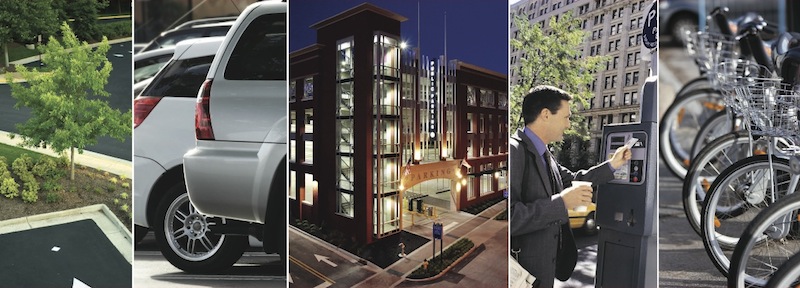According to the results of a just-released survey, the country is undergoing a parking revolution as the industry embraces a variety of new technologies that make it easier for people to find and pay for parking, and for parking authorities to better manage it.
The 2013 Emerging Trends in Parking survey was conducted among members of the International Parking Institute (IPI) and released at the 2013 IPI Conference & Expo, May 19-22. Cities leading in parking innovation include San Francisco; Seattle; New York; Los Angeles; Washington, D.C.; Portland, Ore; Miami; Houston; Boston; Denver; Pittsburgh; and Tampa. Dozens of other cities were identified.
Survey highlights include:
1. Smartphones: Solution to the "space race?"
Topping the list of trends in the $30 billion parking industry is the "move toward innovative technologies to improve parking access control and payment automation," cited by 59 percent of respondents. Another top trend is "real-time communication of pricing and availability to mobile/smart phones" (52 percent).
Both trends are evident in San Francisco's federally-funded SFpark pilot project, which supplies real-time information on the availability and cost of on- and off-street parking, drastically reducing driver circling while hunting for open spaces, congestion, and double-parking.
According to San Francisco County Transportation Authority Park Manager Jay Primus, the city also may be the first in the U.S. to quantify the number of available parking spaces in all public lots, garages, and city blocks. Seattle's new electronic parking guidance system uses dynamic real-time message signs and web information to direct people to available off-street parking at six downtown garages.
2. Payment options continue to expand
The second leading trend is the demand for electronic (cashless) payment, with cities such as Washington, D.C., Pittsburgh, Houston, and Miami, among others, incorporating pay-by-phone programs. Acclaimed as the world's most successful of its type, the D.C. program has earned 550,000 customers and accounts for 40 percent of the city's parking revenues.
About 80 percent of the seven million transactions to date employ smart phones, with payment options that include credit cards, online and mobile money management solutions, and PayPal. Miami and Pittsburgh are among the pioneering cities in incorporating license-plate recognition technology as another means of quick and efficient payment.
3. Taking a smarter business approach
The trends toward "demand for greater parking revenue" (38 percent) and "more public-private partnerships" (24 percent) are demonstrated by Miami's innovative public-private partnerships. Similar programs have been launched in cities such as Houston, where consultants posed the question: "What would a parking program look like if it was managed by Nordstrom?" prompting a focus on parking as an engine for municipal economic development.
4. Green solutions sprouting up
Other notable trends include "collaboration between parking, transportation, and decision makers" (43 percent), "need for improved customer service," (31 percent), and "demand for green/sustainable solutions" (30 percent). Among the technology considered to have the greatest potential in improving sustainability are "guidance systems to enable drivers to find parking faster (and reduce carbon emissions)" (57 percent); "energy-efficient lighting" (55 percent); "encouraging alternative travel" by providing bike storage, car/bike share, access to transit, etc. (42 percent); "accommodating electric-vehicle charging stations: (21 percent), :renewable-energy installations such as solar panels and wind power"; and "innovative water and storm water management systems" (11 percent).
For example, the City of Tampa cut its energy costs in half by upgrading lighting in its parking facilities, joining Miami, Denver, and other cities in offering citywide electric-vehicle charging stations. Miami was among the first U.S. city to partner with a car-share program, which has since taken root in a number of other cities across the country.
Related Stories
Giants 400 | Aug 22, 2023
Top 115 Architecture Engineering Firms for 2023
Stantec, HDR, Page, HOK, and Arcadis North America top the rankings of the nation's largest architecture engineering (AE) firms for nonresidential building and multifamily housing work, as reported in Building Design+Construction's 2023 Giants 400 Report.
Giants 400 | Aug 22, 2023
2023 Giants 400 Report: Ranking the nation's largest architecture, engineering, and construction firms
A record 552 AEC firms submitted data for BD+C's 2023 Giants 400 Report. The final report includes 137 rankings across 25 building sectors and specialty categories.
Giants 400 | Aug 22, 2023
Top 175 Architecture Firms for 2023
Gensler, HKS, Perkins&Will, Corgan, and Perkins Eastman top the rankings of the nation's largest architecture firms for nonresidential building and multifamily housing work, as reported in Building Design+Construction's 2023 Giants 400 Report.
Standards | Jun 26, 2023
New Wi-Fi standard boosts indoor navigation, tracking accuracy in buildings
The recently released Wi-Fi standard, IEEE 802.11az enables more refined and accurate indoor location capabilities. As technology manufacturers incorporate the new standard in various devices, it will enable buildings, including malls, arenas, and stadiums, to provide new wayfinding and tracking features.
Architects | Jun 6, 2023
Taking storytelling to a new level in building design, with Gensler's Bob Weis and Andy Cohen
Bob Weis, formerly the head of Disney Imagineering, was recently hired by Gensler as its Global Immersive Experience Design Leader. He joins the firm's co-CEO Andy Cohen to discuss how Gensler will focus on storytelling to connect people to its projects.
Digital Twin | May 8, 2023
What AEC professionals should know about digital twins
A growing number of AEC firms and building owners are finding value in implementing digital twins to unify design, construction, and operational data.
Design Innovation Report | Apr 27, 2023
BD+C's 2023 Design Innovation Report
Building Design+Construction’s Design Innovation Report presents projects, spaces, and initiatives—and the AEC professionals behind them—that push the boundaries of building design. This year, we feature four novel projects and one building science innovation.
Airports | Apr 18, 2023
India's mammoth new airport terminal takes ‘back to nature’ seriously
On January 15, 2023, Phase 1 of the Kempegowda International Airport’s Terminal 2, in Bengaluru, India, began domestic operations. The 2.75 million-sf building, designed by Skidmore, Owings & Merrill (SOM), is projected to process 25 million passengers annually, while providing its travelers with a healthier environment, thanks to extensive indoor-outdoor landscaping that offers serenity to what is normally a frenzied experience.
Architects | Apr 6, 2023
Design for belonging: An introduction to inclusive design
The foundation of modern, formalized inclusive design can be traced back to the Americans with Disabilities Act (ADA) in 1990. The movement has developed beyond the simple rules outlined by ADA regulations resulting in features like mothers’ rooms, prayer rooms, and inclusive restrooms.
Airports | Feb 28, 2023
Data visualization: $1 billion earmarked for 2023 airport construction projects
Ninety-nine airports across 47 states and two territories are set to share nearly $1 billion in funding in 2023 from the Federal Aviation Administration. The funding is aimed at help airports of all sizes meet growing air travel demand, with upgrades like larger security checkpoints and more reliable and faster baggage systems.


















